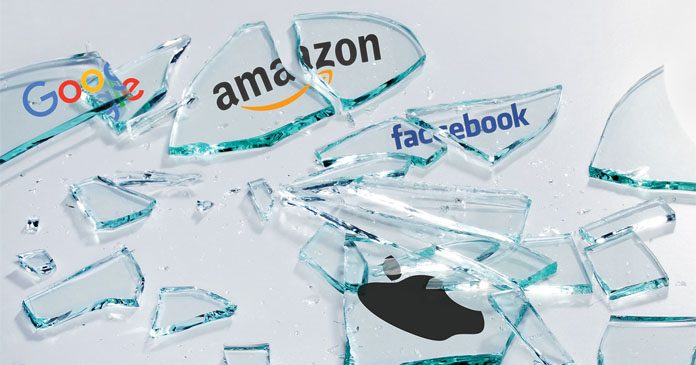The Justice Department is said to be planning an antitrust investigation into Google. Recently, the House Judiciary Committee launched its own antitrust probe. Last year, the Federal Trade Commission announced a probe into Facebook’s privacy practices. While tech companies long have been Republican targets, they are now in the line of fire from Democrats as well. Notably, Democratic Sen. Elizabeth Warren from Massachusetts, who is running for president in 2020, has called for the breakup of Big Tech. House Speaker Nancy Pelosi recently tweeted that “unwarranted, concentrated economic power in the hands of a few is dangerous to democracy—especially when digital platforms control content. The era of self-regulation is over.”
The calls for stepped up regulations on Big Tech come at a time of increasing clout for their platforms, whose oversight doesn’t fall neatly under existing U.S. laws. Their new business models also necessitate a reassessment of antitrust law, said experts.
In this, the U.S. seems to be following Europe. Google is appealing its latest fine of $1.7 billion by European regulators for alleged anticompetitive practices in the online advertising market. This penalty follows a pair of other fines in recent years— $5 billion for anticompetitive behaviors related to Android and a $2.7 billion penalty for Google Shopping antitrust violations, according to a TechCrunch report.
The case against Google is “very strong,” said Eric K. Clemons, Wharton professor of operations, information and decisions, noting that the European Union was penalizing what it saw as an abuse of platform power. Clemons is the author of the book New Patterns of Power and Profit: A Strategist’s Guide to Competitive Advantage in the Age of Digital Transformation.
The issue is not about the size of the companies being problematic per se but about specific behaviors. For example, “Facebook is being sent off to the Federal Trade Commission—so it’s less about monopoly power and more about abuse of consumers, abuse of consumers’ data, and abuse of consumers through lack of transparency,” Clemons said.
Big Tech has “unorthodox business models, and so the investigation itself is well placed,” added Hemant Bhargava, chair in technology management at the University of California at Davis. But based on the complaints against them, he believes the investigation’s outcome will be “much more of a rethink of regulation rather than something that would be punitive.”
Very different issues
The issue with Google is about “the absence of a clear framework around how a search engine should be regulated in terms of how it organizes its results,” said Bhargava. It also has to do with how Google could leverage its search engine dominance to derive synergies in other marketplaces. “The sum of the complaints against Google in Europe, in India and to some extent in the U.S. is that they favor their own properties or their affiliates to the detriment of other firms,” he said.
Clemons also pointed to what he called “the greatest danger from Google”—in two aspects. One is “the abuse of the cost of search,” he said. The cost of keywords in some products comprise one of the largest components in calculating the cost of goods sold—it could be half the selling price of the item, Clemons said.
The other is Google’s ability to use restrictions on its platform for its benefit. For instance, although Android is a free, open-source operating system, Google requires device manufacturers that want access to the Google Play store to set Google as the default search engine and pre-install certain apps, including Google Chrome, YouTube and the Google search app. (This requirement attracted a fine from the European Commission last year.)
The issue is different with Amazon. It is successful because it offers a marketplace for tens of thousands of small sellers, Clemons said. Yet, it has been “systematically dropping the ones with whom they would rather compete directly,” he said. “The abuse of small sellers does violate existing U.S. law, and that’s a concern.”
The bigger concern with Amazon, however, is over the potential of using its Alexa virtual assistant to decide which sellers to use in the future. For example, “if Alexa decides that it’s time for my ‘smart’ fridge to order stuff, who’s Alexa going to order from? It’s going to order from Amazon; it’s going to order from Whole Foods (the supermarket chain Amazon bought in 2017).
Meanwhile, curbing Facebook is about blocking behavior that is “subverting democratic processes around the world,” said Clemons. In the Cambridge Analytica scandal, the British firm used Facebook users’ data without their consent to influence public opinion in the 2016 presidential election and Brexit. “Corrupt governments are willing to pay massive amounts to influence how people vote, so Facebook’s role in that is a dirty business and it probably needs a regulatory sanitation,” he added.
In addition, Big Tech’s treatment of vendors and other partners has long been an issue with regulators. “There are lots of complaints about both Google and Amazon with respect to their contract practices with suppliers, clients and so on,” Herbert Hovenkamp, Wharton professor of legal studies and business ethics, told CBS News. “Exclusivity agreements are a big issue.” For example, “one of these companies will deal with a supplier and make the supplier promise not to sell to any other firms, or give market share discounts where a supplier will get a discount for not dealing with other firms.”
Challenges for regulators
The trouble with regulations is they are typically crafted after the fact. “We didn’t have a policy about massive monopolies in steel or oil until we had massive monopolies in steel or oil,” Clemons said. “We don’t have a regulatory policy now for abuse of search or for abuse of the Android operating system. We don’t have regulatory structures in place for the use of data to support murderous regimes in the Philippines or election manipulation here in the U.S.”
The same was true for regulating e-commerce. “The companies that started doing e-commerce did what they wanted for many years, and exploited the lack of regulatory framework,” said Bhargava, adding that regulation of e-commerce is an ongoing process.
That means issues like Google’s alleged abuse of power in search can be tough to regulate effectively. It is “a different world in terms of business models,” said Bhargava. “It’s really not clear under what laws we could ask a search engine to change the way it does its search results.”
One possible approach is “maybe we need to have laws in which the word ‘platform’ shows up,” Bhargava said. “We need to recognize that this is a fundamental change in business models and that it has to be governed by laws that are appropriate to it.” Second, it should be determined how the new law should be retroactively applied to existing businesses.
On the flip side, Clemons wondered if the current efforts to regulate platform companies could have unintended adverse consequences, such as strengthening rival Chinese firms. “If we over-regulate American Big Tech, which despite my concerns does have some ethical standards and some independence, do we open the path for Chinese domination?” he asked. “If we allow Chinese domination of search, shopping and social networks, how much worse would that be?”
If over-regulation ends up strengthening China’s power in search and so forth, “it could be hugely worse,” said Bhargava. Further, the interconnected nature of online search, shopping and social networks poses other risks. “There would be no way to stop a favored Chinese company from getting bigger and bigger, and weaving its way into American consumers and use that base to stretch out in other areas.”

Does breaking up Big Tech make sense
There are calls to break up Big Tech, but Bhargava said it is not clear what benefits would come from, say, putting Google’s search engine and other activities into different companies. “Google’s search engine at the moment is free. How do they make profit after breaking up the company into smaller entities? It does not appear to me that breaking up is the right remedy today, but the laws need to recognize that it may be appropriate to break up this company” one day.
Clemons noted that breaking up Google’s search product into multiple search engines “would probably make search more expensive for sellers.” As such, there needs to be “a new remedy for dealing with search,” he said. For instance, “having the Android unit separate from Google Apps, and separate from Google search, is actually not a bad idea,” Clemons added.
There could be some similarities to the patent system for pharmaceutical drugs, Bhargava said. Drugmakers invest billions of dollars to develop new treatments, and U.S. patent law grants them exclusivity for a time before allowing competition from cheaper generic drugs. “You have to remember that every one of these firms got into their current positions by having sacrificed profits for 10 or 15 years.”
Bhargava said the questions that arise are these: “How do you enable a business environment where innovators are willing to sacrifice profits for a long time to do something good overall, but eventually they might begin abusing it? What is the window of abuse that should be allowed? Should they be allowed to do it for some time, and then the window closes?”
Arguing that big tech companies “need the opportunity for continued super-normal profit seems a bit of a stretch,” Clemons responded, “but the idea of being fair to entrepreneurs so as not to chill innovation is a very solid point.”

Excerpt: knowledge@wharton













